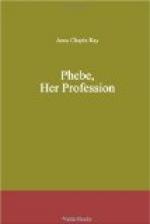“The greatest poet of the century,” Cicely replied glibly, mindful of local prejudice.
“And your favorite poem?” he asked insinuatingly.
Then at last Cicely floundered, for she was quite beyond her depth.
“I think the Rubaiyat is by far the best,” she said gravely, and her querist received the announcement in perfect good faith.
It was some weeks afterwards that Theodora, turning over her mail, came upon a marked copy of the Intermountain.
“What in the world is this?” she said in astonishment. “I never heard of the paper.”
She opened it, and then she gasped. Upon the first page appeared a woodcut, evidently culled from the advertising department, and beneath it these headlines:
“Interview with Mrs. Theodora Farrington.
Alone with Her Tea-Kettle.
The Famous Young Author Works by Night.
The Inspiration of Genius by the Hob.”
Theodora read it through, carefully, deliberately, down to the final statements in regard to Browning. She wondered at first. Then the light dawned upon her, as she came upon a carefully-turned phrase descriptive of “the little grey dog, the constant companion of his gifted mistress,” and she looked up.
“Cis, you wretch!” she said.
But Cicely had been watching her face and, as she watched, her own dimples had grown deeper.
“Didn’t you tell me I might?” she asked meekly.
“Yes,” Theodora acknowledged; “yes, I did, and I don’t know but it was justifiable. He must have been an innocent youth, Cis; but it’s not so much worse than some of the tales told by men who have really seen me; only—don’t do it again, dear. It might make me serious trouble.”
“But, after all,” she said to her husband, that night; “I am not so very sorry. They needn’t make public property of us and our work. It is none of their affair, anyway; and Cicely has only done what I have wanted to do, and didn’t quite dare. If more people had a deputy to be interviewed for them, it might put a stop to the literary columns in a good many minor papers.”
And her husband agreed with her.
CHAPTER NINETEEN
Down in Philadelphia, that fall, Phebe was having her first experience of bitter homesickness. She had always supposed herself immune from that dire disease, and, for some time, she had no idea what was the matter with her. In vain she tried to trace the cause of her complaint to malaria and to every known form of indigestion. She studied her symptoms carefully and tried to match them up, one by one, to the symptoms recorded in her text-books. At last, she was forced to the ignoble conclusion that she was suffering from homesickness pure and simple, homesickness in one of its acutest forms. Her appetite for her work declined in proportion to her appetite for her food. She was listless, dull, and, it must be confessed, most deplorably cross. The fact of the matter was that the girl was pining for the broad lawns of The Savins, for the shabby red house, for her father and Hubert, even for Cicely and Cicely’s dog Melchisedek.




